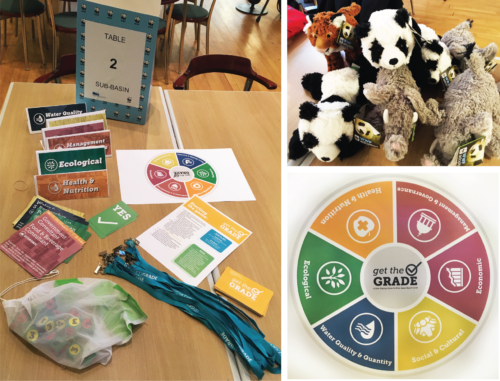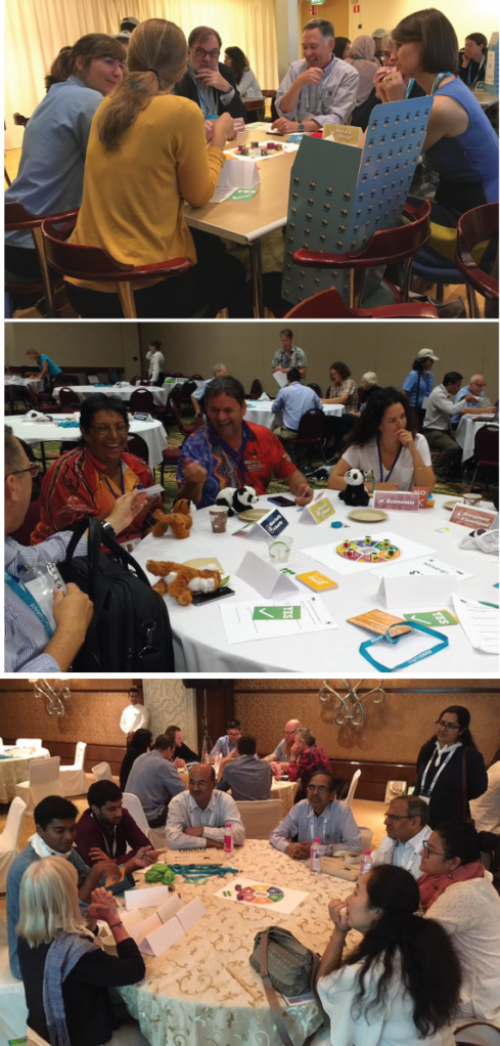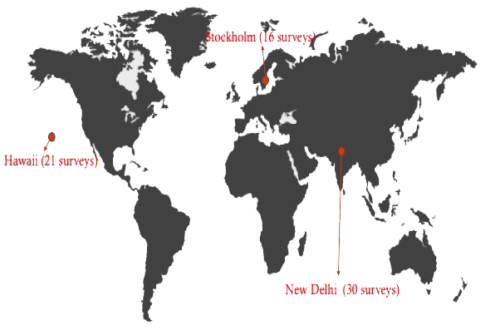The report card game “Get the Grade!” was launched in Stockholm, New Delhi and Honolulu
Bill Dennison ·The Basin Report Card Initiative, a partnership between the University of Maryland Center for Environmental Science and the World Wildlife Fund, worked closely with game developers from the Engagement Lab at Emerson College to produce a fun, interactive and thought provoking game, “Get the Grade!”. “Get the Grade” was successfully launched at three signature events across the globe: World Water Week in Stockholm, Sweden (1 Sept 2016), IUCN World Conservation Congress in Honolulu, Hawaii (5 Sept 2016) and International Riversymposium in New Dehli, India (14 Sept 2016). In each of these events, participants gathered around game tables to role play, negotiate, and form partnerships with the goal of raising their report card grade. Report card grades were based on six river basin values: ecological, water quality & quantity, social & cultural, health & nutrition, management & governance, and economic.

Participants are randomly selected to act as a character (role playing) for one of the six values, e.g., a Food & Beverage Consultant focused on economic issues, or a Researcher focused on ecological issues. The players wear a character card and have a placard in front of them to indicate their respective values. A set of dice with both stoplight colors and numbers are used to calculate report card scores. A deck of cards (Basin Deck) are used in the game with the following types of cards: 1) Partnership card, where players form alliances with other values, 2) Vote card, which represent policy decisions that each player votes on, 3) Decide card, in which players can make unilateral decisions after consultation which other players, and 4) Event cards, which represent major occurrences that impact the entire sub-basin. An initial report card score is generated for each table representing different sub-basins. After several rounds of playing by drawing cards from the Basin Deck, report card scores are modified. One of the major lessons from this game is that through collaboration, individuals representing different values can work together to obtain higher report card grades.

We conducted 67 anonymous surveys of participants following these three game sessions. When we asked if the game did a good job of showing the power of the report card to drive change, the responses were overwhelmingly positive (81%). We asked if the game did a good job of showing how the report card makes it easier to make decisions, the responses were again positive (76%). Participants most enjoyed the negotiations (27%) and role-playing (26%), but also enjoyed the voting (10%). The least enjoyable response was the time available for the game (60-90 min sessions), which showed that participants were having fun and wanted to continue to play. We asked if the game made them interested in finding out more about basin report cards, and the response was extremely positive (87%). Comments included suggestions for ways to tweak the rules, positive expressions of the fun that the game engendered and several people expressed a desire to see the game used in more settings.

The definition of a game in the Merriam-Webster dictionary is “a physical or mental activity that has rules and that people do for pleasure”. Get the Grade! is indeed a mental activity with rules, and the most important aspect is that it is a fun, indeed, pleasurable activity.
As a wrap up during the game session I joined at World Water Week, facilitated by Sarah Davidson and Holly Mckinlay from WWF, I wrote the following poem:
Get the Grade!
1 Sept 2016
This morning a small bit of history was made
Here at World Water Week in sunny Stockholm
So I felt the need to write this little poem
To celebrate the launch of Get the Grade!
Sarah and Holly ran the show
Giving us a chance to really play
And teaching us how to get an A
So that our report card smarts did grow.
We learned how nice it was to get a partnership card
Using this card could really save the day
To cope with events that came our way
Showing us the value of working together no matter how hard.
And I think that the very best of all
They came up with some surprises
We received some nice panda prizes
Better than anything you get at a shopping mall.
I know that now we all have to run
But playing this game did make us think
And the reason Get the Grade! did not stink
Is because we all had lots of fun.
About the author
Bill Dennison

Dr. Bill Dennison is a Professor of Marine Science and Vice President for Science Application at the University of Maryland Center for Environmental Science.
Next Post > UMCES active in the 2016 River Symposium in Delhi, India
Comments
-
Chad 8 years ago
How can we get a copy of the game Get the grade?

